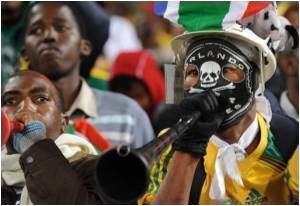Say ‘Africa’ and the images that flash through one’s mind are of its fabulous Wild life, unique culture and, of course, the ongoing World Cup Football.
But it appears that the focus of the game is shifting from the regular paraphernalias to something as mundane as the vuvuzela!The vuvuzela, (origin:zulu- “making a vuvu noise”) lovingly nicknamed vuvu, is modelled on the horn of the kudu antelope, that was initially used by some South African tribes for faraway- communications, or to call folks to assemble for village meetings.
The noise emanating from the vuvu closely resembles that from a foghorn. Its popularity at football games is based on the local belief that if loud noises can kill baboons, it can also reduce opponents to a shriveled pulp on the soccer field.
Modern- day palstic versions of the vuvus are believed to have originated in the ghettos of the South African townships and have been ferevently used by soccer fans there. The vuvus act like bellows that further fan the passion of football supporters.
The immense popularity of the metre–long vuvus the world over has resulted in its mass production and has tipped the sales scales in its favor. England, in particular, recorded an incredible high.
Fifteen thousand Vuvus, have been sold by chain stores like Sainsbury, at £2 per piece. These stores expect to sell 60,000 more easily, as the World Cup progresses. Online retailer Amazon, too, has reported an escalation in demand for vuvus this season.
And it is precisely for this reason that American corporates are vying with each other to patent the noisy and belligerent instrument. This move is seen by many as one that would deprive the Africans of their indigenous right to the vuvus.
Vuvu Hazards
Doctors have warned fans that they would be at risk of a permanent hearing loss if they happen to be standing too close to a vuvu during the matches.
The vuvuzela emits a unique droning noise akin to that emitted by a swarm of bees. Its sound, louder than that from a chainsaw, has been measured at 127 decibels which, according to the Royal National Institute for Deaf People, is capable of causing tinnitus temporarily, besides other long-term impairment.It must be noted that noise over 85 decibels is potent enough to cause long- term hearing damage.
According to an expert,“Football fans are running the risk of tinnitus -- ringing, whistling, humming or buzzing in their head or ears -- or permanently damaging their hearing if they don't tackle the cumulative effects of exposure to loud volumes from vuvuzelas and music during the World Cup.”
The noise is also a deterrant to players who have already complained of their inability to focus or hear one another on the field. Commentators too have protested that the din created by the vuvus make it impossible for them to be heard. Many in the European delegation feel that the vuvus are even disrespectful.
Excessive noise can cause irritation, headache and can even trigger migraines in sensitive people. It can also prove fatal in those with weak hearts.
The boistrous cacophony created by the vuvuzelas has annoyed the world football governing body, FIFA, that they even considered banning them from the World Cup scene until the South African Football Association raised a protest and insisted that the vuvus were a part and parcel of the football tradition in South Africa.
As the situation stands now the vuvus are here to stay!!
Damage Control
Banning the cultural traditions of Africa (of which vuvus are an integral part) during the African world cup would be looked upon as an insensitive move by European ‘imperialists,’ despite the nuisance that the horn is reported to be causing.
After all vuvus are a symbol of Black South Africa and the last thing that the organisers want is to be accused of racism in Africa against Africans.
The african officials have requested their guests to embrace their culture and their methods of celebration.One has to wait and watch as to how many actually do it!!
So experts are looking at other options. They have urged football fans to wear earplugs if they are at a risk of long -term exposure to vuvuzelas, at close quarters. Councils in the UK trust the wisdom of fans and believe that the latter would use it with discretion. This, one feels, is better said than done!
The growing dissent against the vuvus has prompted some companies to come up with a toned down version which has a modified mouth piece.
According to Van Schalkwyk, whose company owns the vuvuzela trademark, the modified version will create a noise that is 20 decibels lesser than the older one. They hope to popularize this version by promoting it at public football- viewing areas. This is a welcome move indeed, but it needs to gain mileage with fans.
Rules must be in place for those who do not believe in another’s right to peace. Only then the World Cup experience will be an enjoyable one, both for the fans and, for those who are not!
Source-Medindia








